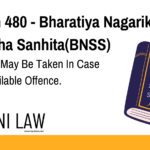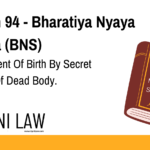Code: Section 482 BNSS
Bail for a Person Apprehending Arrest on Non-Bailable Offence
(1) When any person has reason to believe that he may be arrested on an
accusation of having committed a non-bailable offence, he may apply to the High Court or
the Court of Session for a direction under this section; and that Court may, if it thinks fit,
direct that in the event of such arrest, he shall be released on bail.
(2) When the High Court or the Court of Session makes a direction under
sub-section (1), it may include such conditions in such directions in the light of the facts of
the particular case, as it may think fit, including—
(i) a condition that the person shall make himself available for interrogation by
a police officer as and when required;
(ii) a condition that the person shall not, directly or indirectly, make any
inducement, threat or promise to any person acquainted with the facts of the case so
as to dissuade him from disclosing such facts to the Court or to any police officer;
(iii) a condition that the person shall not leave India without the previous
permission of the Court;
(iv) such other condition as may be imposed under sub-section (3) of
section 480, as if the bail were granted under that section.
(3) If such person is thereafter arrested without warrant by an officer in charge of a
police station on such accusation, and is prepared either at the time of arrest or at any time
while in the custody of such officer to give bail, he shall be released on bail; and if a
Magistrate taking cognizance of such offence decides that a warrant should be issued in
the first instance against that person, he shall issue a bailable warrant in conformity with the
direction of the Court under sub-section (1).
(4) Nothing in this section shall apply to any case involving the arrest of any person
on accusation of having committed an offence under section 65 and sub-section (2) of
section 70 of the Bharatiya Nyaya Sanhita, 2023
Explanation of Section 482 BNSS
Section 482 of the BNSS addresses situations where a person believes they might be arrested for a non-bailable offence. In such cases, the individual has the option to apply to the High Court or Court of Session for a direction to be granted bail in the event of an arrest. This section outlines the conditions under which the Court may grant bail, such as making the person available for police interrogation, preventing them from influencing witnesses, or prohibiting them from leaving India without permission.
Furthermore, if the person is arrested, and they are ready to offer bail, they will be released. If a Magistrate decides that a warrant is necessary, they will issue a bailable warrant.
Importantly, Section 482 does not apply to cases involving offences under Section 65 and Section 70 of the Bharatiya Nyaya Sanhita, 2023.
Illustration
Example 1: Application for Bail
A person fearing arrest for a non-bailable offence applies to the High Court for a direction to be released on bail if arrested. The Court grants the direction and specifies conditions such as making themselves available for interrogation and not leaving the country.
Example 2: Conditions Imposed by Court
The Court of Session grants bail but includes conditions like ensuring the accused does not influence witnesses and requires the person to obtain permission before leaving India.
Example 3: Arrest and Bail
After the person is arrested, they are prepared to offer bail. As per the direction of the Court under Section 482, they are granted bail. If a Magistrate decides to issue a warrant, it will be a bailable warrant.
Common Questions and Answers on Section 482 BNSS
1. What can a person do if they fear arrest for a non-bailable offence?
- Answer: The person can apply to the High Court or Court of Session for a direction to be granted bail in the event of their arrest.
2. Can the Court impose conditions for granting bail under Section 482?
- Answer: Yes, the Court can impose various conditions, such as making the person available for police interrogation, preventing interference with witnesses, or prohibiting leaving the country without Court permission.
3. What happens if a person arrested under Section 482 is ready to give bail?
- Answer: If arrested, the person will be granted bail if they offer bail, in line with the Court’s direction.
4. Does Section 482 apply to all offences?
- Answer: No, Section 482 does not apply to cases involving offences under Section 65 and Section 70 of the Bharatiya Nyaya Sanhita, 2023.
Conclusion
Section 482 of the BNSS provides a legal framework for individuals who fear arrest on non-bailable charges, allowing them to apply for bail in advance. It sets conditions for the accused’s release and details the process if the individual is arrested. This ensures that individuals’ rights are protected while also maintaining the integrity of the judicial system.








